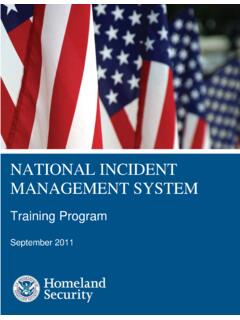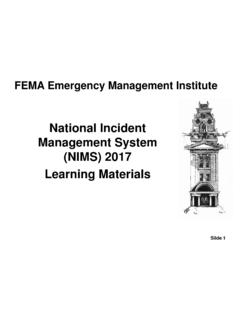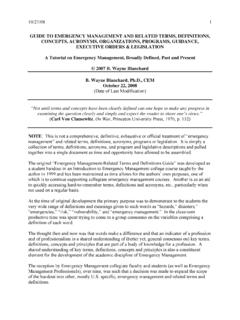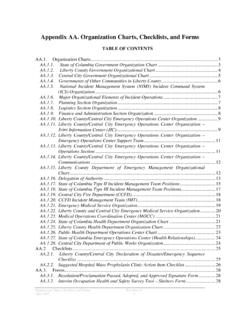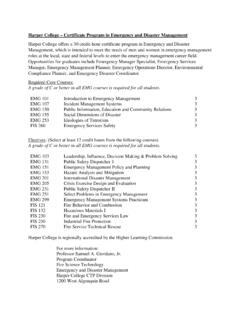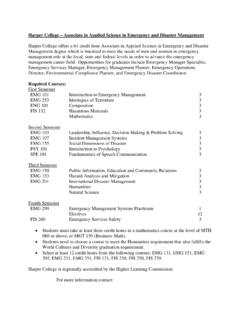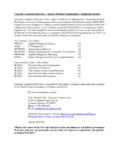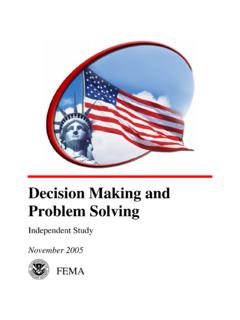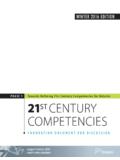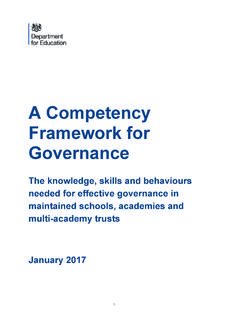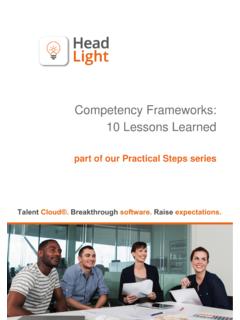Transcription of The Next Generation Emergency Management …
1 The next Generation Emergency Management core competencies April 28, 2016 Work submitted by next Generation core competency Focus Group next Generation Emergency Management core competencies 2 Foreword During the 2015 FEMA Higher Education Symposium, interest was expressed for a systematic and comprehensive look at Emergency Management core competencies for the next Generation . Therefore, the FEMA Higher Education Program supported the education community s process of updating the Emergency Management core competencies , developed by Dr. Wayne Blanchard in 2005, by sponsoring a focus group of regionally diverse educators. The charge given the group was to draft competencies for 2030 and beyond, and conduct a Delphi study for refinement and ratification of the updated competencies . During the two days of on- site work, the focus group debated the drivers of future disasters and what foundations an Emergency manager of 2030 and beyond might require.
2 Consensus was reached with drafted competencies . Focus group members conducted the 2 cycle Delphi study and analyzed the data obtained toward refining the competencies and their definitions. Invaluable to this work were the Delphi participants, Wendy Walsh (FEMA Higher Education Program Director), Barbara Johnson, and Shannon Cool (both of FEMA Higher Education Program). With deep appreciation, we acknowledge those who accepted the invitation to be a Delphi Participant, and informed the refinement of the competencies . Baden, Tim Bissell, Rick Burkle, Comfort, Louise Goss, Kay Horton, Heath Johnston, David Jones, Anna Marie Lindsay, John Mileti, Dennis Muhr, Margaret Mwarumba, Njoki Provencio, Alyssa Rosegard, Lyn Rubin, Claire Senger, Mary Shoemate, Justin Styles-Emerson, Amber Focus Group Facilitators Shirley Feldmann-Jensen, California State University Long Beach Steven Jensen, California State University Long Beach Sandy Maxwell-Smith, Arkansas Tech University, Russellville Focus Group Participants Dee Dee Bennett, University of Nebraska, Omaha Stephen Carter, Fredrick Community College Carol Cwiak, North Dakota State University James Phelps, Angelo State University Robert Schwartz.
3 University of Akron next Generation Emergency Management core competencies 3 Introductory Context for the next Generation Emergency Management core competencies The world is becoming more interconnected and interdependent with each passing day, transforming the systems we live and work in. Once familiar roles are evolving at an accelerated pace. Interactions between the social, built, and physical environments are creating greater risk complexities. This new terrain has an impact on the practice of Emergency Management , today and into the future. Therefore, it is important to explore what foundations are needed for Emergency Management professionals to address evolving risks. The next Generation of Emergency Management professionals must be self-programmable, values-based, flexible, able to adapt to changing cultural models along the life cycle, capable of bending without breaking, and possess the ability to remain inner-directed while evolving with the surrounding society (Castells & Cardoso, 2005).
4 An examination of the drivers of change over the next couple of decades is critical to understanding the competencies that will be at the core of Emergency Management professionals successful practice. core competencies are characterized as ..the collective learning in the physical assets, which deteriorate over time, competencies are enhanced as they are applied and shared (Prahalad & Hamel, 1990). core competencies are used in a variety of ways. Most commonly, they are used to develop student learning outcomes for training and education programs; core competencies can also provide transparency for workplace performance. The goal of this effort is to establish next Generation core competencies that are likely to underpin the Emergency Management workforce of 2030 and beyond. These core competencies are built on existing Emergency Management purview and competencies . The methodology comprised a broad literature review of global disaster risk trends, a review of related core competency projects, a FEMA-sponsored Focus Group, a two phase Delphi Study, and wider consultation.
5 The competencies oriented toward future needs were generated and refined through these processes, and are presented on the following pages. next Generation Emergency Management core competencies 4 next Generation Emergency Management core competencies Broad Knowledge Base 1. Scientific Literacy Emergency Management professionals must possess a fundamental understanding of the natural, social, fiscal, and applied sciences as they impact the local, regional, national, and global community. Scientific literacy is the capacity to use scientific knowledge, to identify questions and draw evidence-based conclusions in order to understand and help make decisions about the natural world and the changes made to it through human activity (OECD, 2004, pp. 123-3). The scientific process provides an objective means to work through complex problems, enhance decision-making, and interact with multiple stakeholders. Scientific literacy helps Emergency Management professionals understand and interpret the scientific evidence as it relates to hazards, risks, and vulnerabilities so it can be effectively communicated to policy makers and the public.
6 2. Geographic Literacy Emergency Management professionals must possess a foundational understanding of the geographic configurations of hazards, vulnerability, and risk. This comprehensive understanding better enables Emergency managers to determine the day-to-day risks they are addressing. Geographic literacy is evident in the ability to conceptualize the interconnections, interactions, and implications of complex environments, as well as, the ability to utilize available analysis and technological tools to track environmental changes that result in changing risk profiles. 3. Sociocultural Literacy Emergency Management professionals must recognize the ways in which sociocultural factors contribute to population vulnerability. Sociocultural literacy provides the lens to examine and understand human behavior, and the ways in which humans, both individually and collectively, may increase their vulnerability to risk. An understanding of sociocultural dynamics, such as the rules and unwritten nuances of social groups and subgroups, economic disparities, the importance of trust, empathy, and respect both within and across groups, differential impacts based on needs, gender, age, ability, etc.
7 , population movement, and increasing pluralism, is necessary for enhancing community capacity, capability, and resilience. 4. Incorporate Evolving Technologies Emergency Management professionals must be able to exercise informal influence across organizational boundaries with public, private, non-profit and academic partners in order to harness and incorporate converging and emerging technologies. Doing so requires an understanding of available technology, recognition of the expertise needed to utilize such technology, and a grasp of the security measures necessary to protect the technology; and an ability to recognize and evaluate the value of technological solutions to Emergency Management . next Generation Emergency Management core competencies 5 Organizational Acumen 5. Understanding Complex Systems Emergency Management professionals must be able to work in global systems, understand and manage interconnections, and recognize interdependencies to reduce risk.
8 The non-linear and emergent characteristics of complex systems can bring about unexpected outcomes that exacerbate risk. The world is increasingly interconnected and interdependent, and the ability to read and understand complex systems is necessary to successfully address newly developing hazards, vulnerabilities, risks, and opportunities in the social, built, and physical environments. 6. Risk Governance The Emergency Management professional must be able to advocate for risk awareness, assessment, measurement, and reduction across a broad spectrum of stakeholders. The way in which risk is managed is referred to as risk governance, and includes all levels. The complexity of risk governance in a global community requires recognition that risk is inherent in interdependencies, risk governance spans individuals ownership of risk, and the present and future risk implications are inherent in stakeholders decisions and activities.
9 Problem-solvers 7. Critical Thinking The Emergency Management professional must be a critical thinker. Critical thinking is a disciplined intellectual process that involves innovative thinking that is fundamental in decision-making in complex environments. Critical thinkers identify, analyze, synthesize, apply, and evaluate data from all sides of an issue with a focus on improving problem solving and informing actions. Critical thinking places emphasis on the importance of finding and recognizing relevant evidence, making clear the relationships between potential causes and effects, and understanding the relationship between sometimes complex variables before making decisions. 8. Professional Ethics The Emergency Management professional must be ethical. Professional ethics are framed by standards that delineate expected and appropriate conduct, principles, and moral and ethical values that guide practice in the face of both known and emerging issues.
10 Emergency Management professionals must both abide by and champion professional ethics, to ensure professionalism and address power inequities. 9. Continual Learners The Emergency Management professional must be a continual learner. Operating in a dynamic and continually evolving risk environment requires more than the simple acquisition of new skills and fact accumulation. Continual learners develop and nurture a frame of mind that values and utilizes curiosity, reflection, and the development of new capabilities. next Generation Emergency Management core competencies 6 Emergency Management Leadership 10. Operate within the Emergency Management framework and Principles The Emergency Management professional must utilize a proactive, anticipatory, and innovative approach for guiding public policy and in the application of the Emergency Management framework and principles. Emergency Management seeks to promote safer and more resilient communities.

